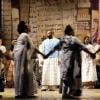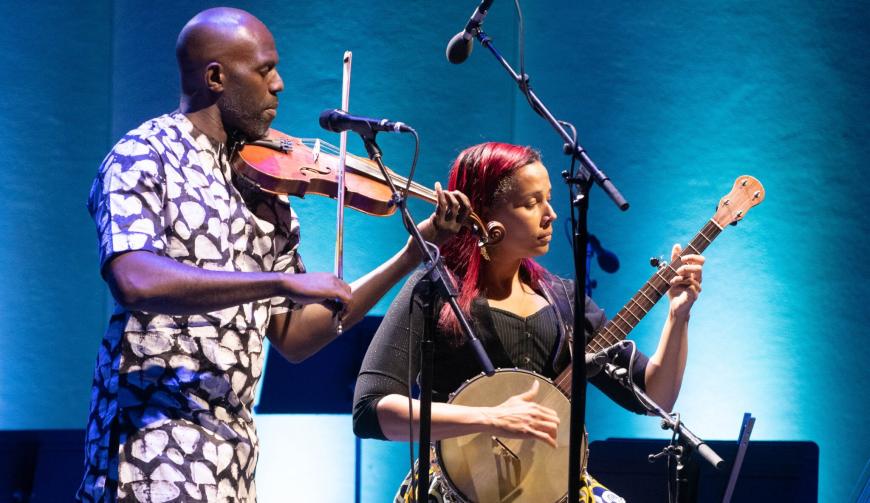
The 77th annual Ojai Music Festival, through the lens of the category-busting and diversely gifted artist Rhiannon Giddens, who served as this year’s music director, was fine and inspiring. Giddens was arriving at Ojai in the wake of having garnered the 2023 Pulitzer Prize in Music, along with composer and collaborator Michael Abels, for the opera Omar, presented at Ojai on Saturday in the form of Omar’s Journey, a compact chamber version of the work.
The nagging problem was that this year’s festival (which ran June 8–11), strong as it was by its own standards, often seemed an ill fit for the Ojai mode we’ve come to know over the decades. In what may have been the most accessible festival yet, Giddens’s worldly gathering satisfied in simple, rootsy ways but lacked the depth or challenge of the usual Ojai perspective. On the plus side, the program was interwoven with explorations of Chinese and Iranian composers, the latter via members of the intrepid Iranian Female Composers Association.
Ojai’s legacy is a lofty one, tinged with the institutional memory of visits by Igor Stravinsky, Aaron Copland, Pierre Boulez, Olivier Messiaen, Esa-Pekka Salonen, and the late Kaija Saariaho (to whom the 2023 festival was dedicated). This year’s model was enlightening from an outlier perspective and as a pleasurable anomaly in the festival’s history book.
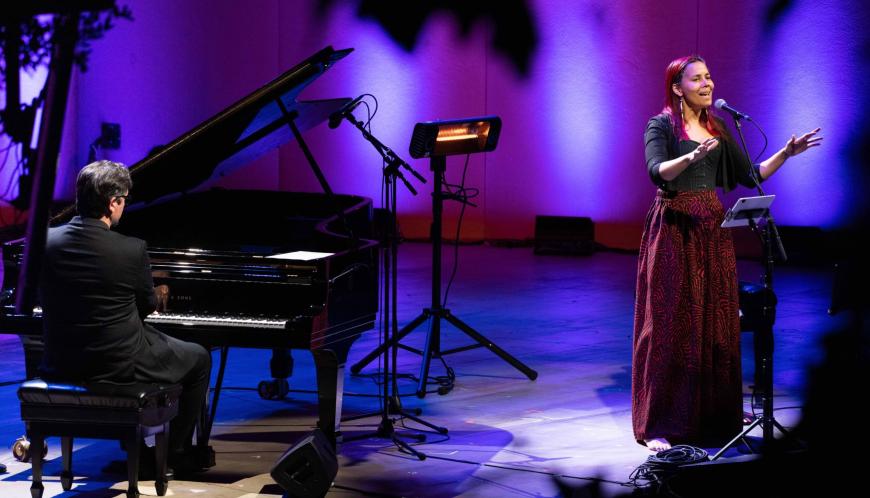
Giddens, who crafted the long weekend program with her partner Francesco Turrisi and Ojai’s nimble artistic director, Ara Guzelimian, first graced the festival’s central Libbey Bowl stage in 2021 at the invitation of that year’s music director, composer John Adams. She appeared with Turrisi and also navigated the turf of Adams’s arias before delving deep into Black American roots music, her terrain as a North Carolina-born musician with a widening sphere of influence and growing public profile. The success of her first Ojai encounter led to this year’s event, an idea no doubt also supported by the greater commercial and audience appeal of a Giddens-guided weekend.
Tying into the general festival theme of crossing genres and “bridging worlds,” “Liquid Borders” was the apt title of Thursday night’s opening concert, taken from a piece by Gabriela Ortiz, performed, with exactitude and spirit, by Steven Schick’s percussion ensemble red fish blue fish. The evening’s main event was a seamlessly woven 90-minute tapestry of short works by Ojai’s resident ensemble, the Attacca Quartet, from Haydn (with reverb!) to Adams, Philip Glass, a couple of simple songs featuring Giddens, and Squarepusher’s hyperactive electroacoustic Xetaka 1, replete with a thrilling unison line to close.
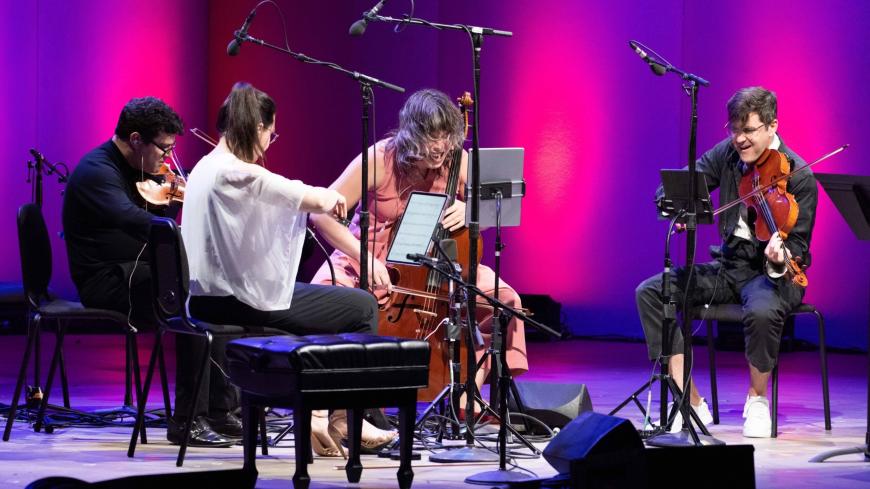
Also included was Zakir Hussain’s Pallavi, written for the Kronos Quartet and here distractingly interpolating canned tabla into the otherwise live mix. The Kronos connection continued with one of the festival’s high points, an expanded version of Tan Dun’s Kronos-commissioned, ritualistic, and Bach-inflected Ghost Opera (1994), which had two performances Friday and Saturday. This version proved the work’s timelessness, with the freshening addition of pipa virtuoso Wu Man and Taiwanese dancer and choreographer PeiJu Chien-Pott.
Friday night’s duet show was craftily set up as an art-song recital — just piano and voice, with cellist Karen Ouzounian contributing to a couple numbers as well. But by any name, the evening was, in fact, just an artful pop concert, with a setlist that included “La Vie en rose,” vintage blues numbers by Alberta Hunter and Ethel Waters, Italian pop songs from the 1960s, and Giddens’s poignant and profound take on Paul Simon’s “American Tune,” which she sang with the songwriter at his Grammy tribute evening in 2022. The closest thing to a contemporary art song here was Shawn Okpebholo’s powerful and structurally rangy “Ahmaud,” which addresses the killing of Ahmaud Arbery and was delivered with emotional control and measured indignation.
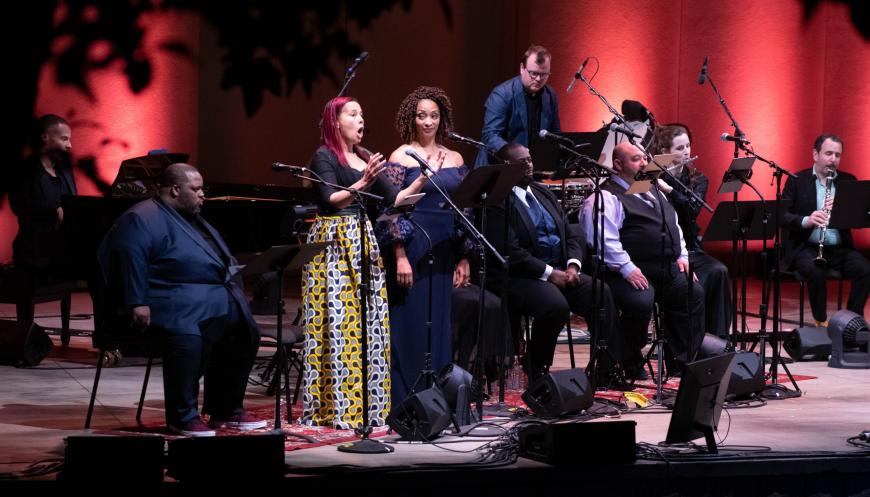
Giddens’s noble and determined interest in grappling with the aftereffects of slavery and other injustices afflicting Black Americans found moving expression at Ojai — from the tale of the heroic slave and scholar Omar Ibn Said (the subject of her opera) to a captivating “reading” of her slavery-themed children’s book, Build a House. Before an overpacked audience in Chaparral Auditorium, the sometimes banjo-bearing Giddens (with Turrisi on frame drum) magnetized children and adults alike by sharing a few songs and a bit of instrumental history.
The theme of slavery transformed into artistic urgency was also reflected in a special Sunday performance of Carlos Simon’s Between Worlds. The four solo string pieces that make up this work were inspired by the artist Bill Traylor, who was born a slave in 1853 and lived until 1949. The viola movement, expertly played by Mario Gotoh, was the most effective, with its ambiguous stylistic stamp stopping in at church for a wisp of spiritual-like harmony.
One of the deepest and most persuasive concerts of the weekend was found on the festival’s periphery. Friday morning’s program at Besant Hill School’s Zalk Theater radiated the kind of serious musical inquiry and uncompromising expression that Ojai is best known for. Among the concert’s treats were Density 21.5, Edgard Varèse’s modernist classic for solo flute, beautifully realized by Emi Ferguson, and Echoes From the Gorge, a percussion piece by the still-underrated Chinese composer Chou Wen-chung, given its due precision and power by red fish blue fish.
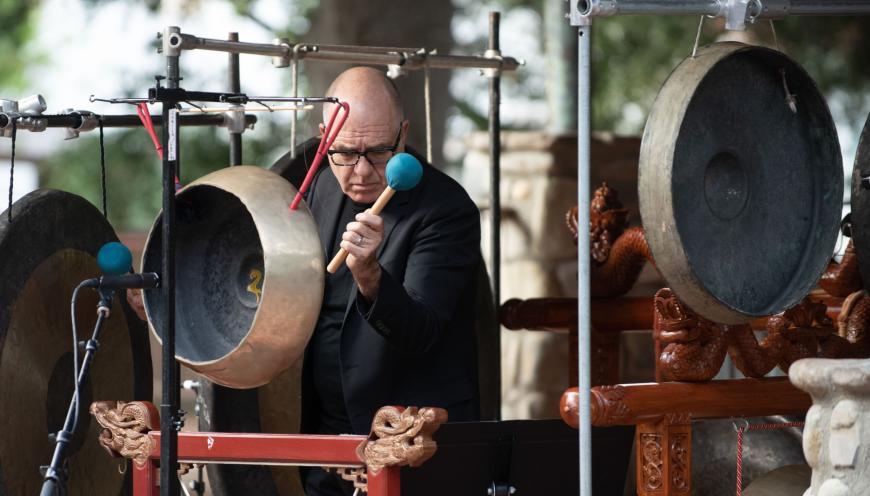
Echoes made for one of the ecstatic musical moments of the festival, which set the stage for more impressive Chinese and Chinese American compositions, including pianist Gloria Cheng’s performance of Chou’s poetic The Willows Are New and Wu Man and Attacca violist Nathan Schram’s duet on Lei Lang’s Mother’s Song.
The “Morning Meditation” programs offered contemplative sessions by resident improvisors: Niloufar Shiri on the Iranian kamancheh and Seckou Keita (also heard in an introductory solo spot before Omar’s Journey) on the Senegalese kora.
The Sunday morning slot went by the coy name of “Early Music” (as in pre-Classical-era music at an early concert time). The wide-ranging program was curated by Turrisi, whose background includes work with Renaissance music, along with jazz and various folk traditions. The setlist, announced from the stage, leapt from 17th-century theorbo pieces by Alessandro Piccinini, played with restrained flair by Joshua Stauffer, to the string-quartet arrangement of Arvo Pärt’s Summa, played by the Attacca Quartet, to excerpts from the Giddens and Turrisi’s ballet Black Lucy and the Bard. It made for an eclectic cohesion that didn’t always work but was nonetheless ambitious and illuminating.
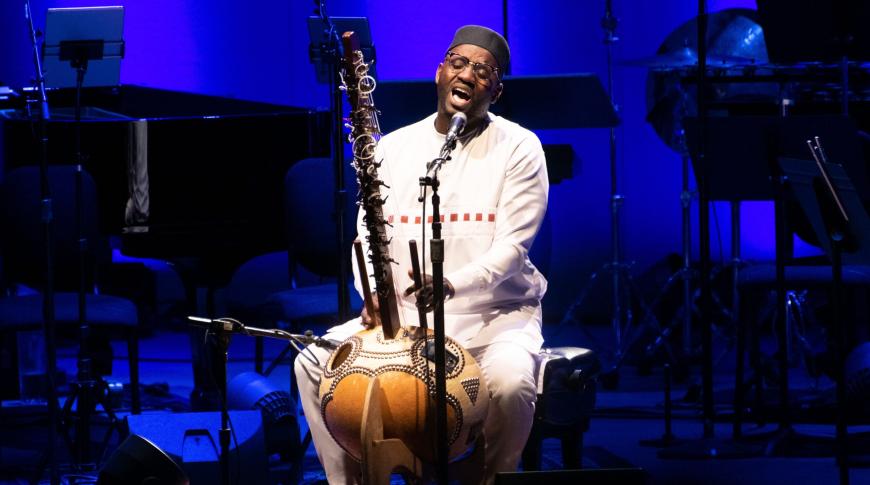
Sunday evening’s disappointing and dissipating finale left much to be desired, consisting mainly of improvisational ventures from this year’s troupe of musicians. The finest moment was an empathetic duet between Giddens on banjo and Wu Man on pipa, with Giddens’s golden voice singing in Chinese. Elsewhere, though, a duet between Keita and kamancheh player Kayhan Kalhor included a 15-minute jam on what were essentially the “Stairway to Heaven” chords (A minor, F, G), while the full ensemble vamped vapidly in Iberian mode to close. Suddenly, it felt like we weren’t in Ojai anymore but at a hip jam-band festival.
Sincere kudos should be extended to Giddens and company for putting together a fantastic, fun-loving, but also historically conscious festival. I would have loved to enjoy it somewhere other than Ojai. Contemporary-music hardliners can take solace in the news that next year’s music director is pianist Mitsuko Uchida, who will no doubt put the festival back in its modernist mode.
Correction: As originally published, this review misidentified the kamancheh player for Saturday’s “Morning Meditation” program. It was Niloufar Shiri, not Kayhan Kalhor.



